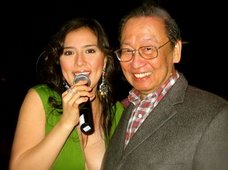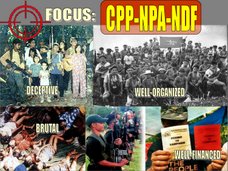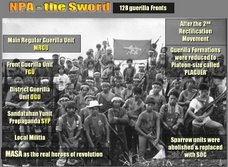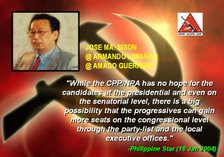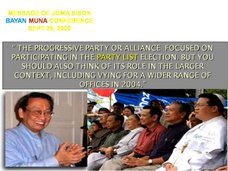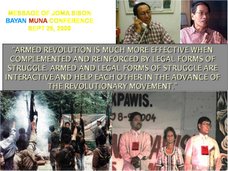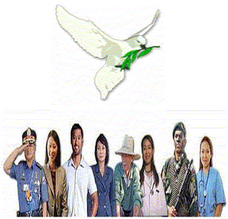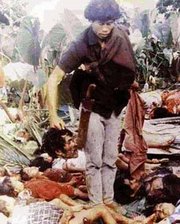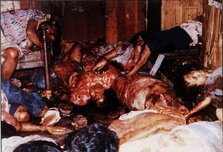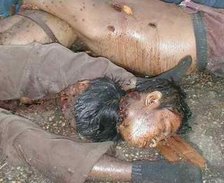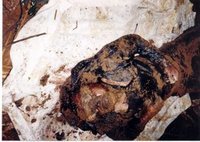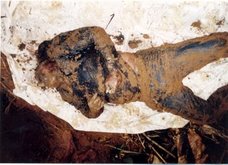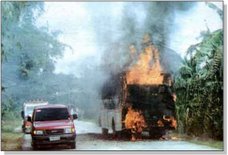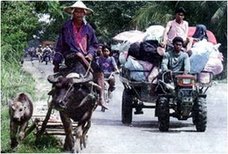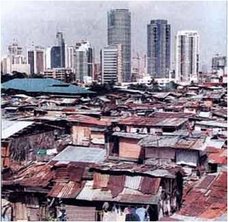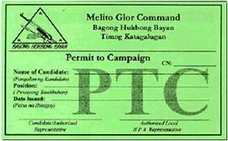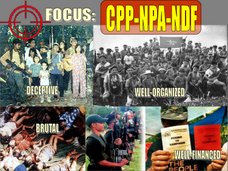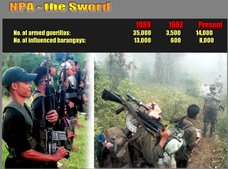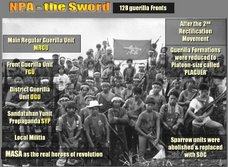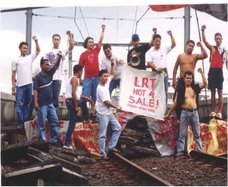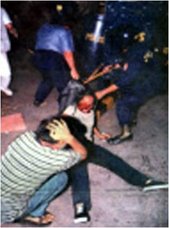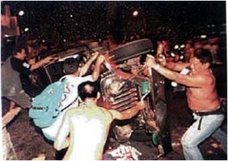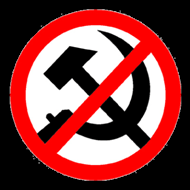 Volume 1, Series 6 Newsletter Date March 28, 2007
Volume 1, Series 6 Newsletter Date March 28, 2007AN ALTERNATIVE VIEW TO THE WAVE OF KILLINGS
 MANILA -
MANILA - In the wake of the continuous killing of leftist militants, Bayan Muna and its allied organizations (along with a sympathetic media whose members have also been killed in disturbing numbers) have endlessly pointed to the military as those responsible for the murders. Bayan Muna and Karapatan has cited that it is only the government which has the motive to kill activists who are staunch critics of the administration.
The Usual SuspectsThe militant group Bagong Alyansang Makabayan of Bayan recently released 'A Primer on the killings of Activists' culled mostly from reports of Karapatan. Said primer tagged the Armed Forces as the perpetrators, arriving at such a conclusion based on "a study on the means, motives and opportunities." They cite that only the military "has the means of launching such offensives on a nationwide scale."
The military has repeatedly denied responsibility, challenging its accusers to present proof and file charges in the courts. In its rebuttal, it has pointed to, among others, a renewed purge within the Communist movement reminiscent of the hysterical anti-infiltration campaign of the Communist Party of the Philippines (CPP, for brevity) in the 1980's and 1990's.

This piece does not aim to pre-judge the ongoing investigation of the police, nor does it intend to absolve the military of any involvement. But as critics of the military have been allowed to put forward their biased theories that media has readily accepted, other possible angles to the killings have been conveniently set aside, depriving our people of a clearer picture of the developing situation.
The Haunting Communist PurgesBayan Muna Party-List Reps. Satur Ocampo and Teodoro Casiño have gone to great lengths to dismiss the military's claim of a continuing purge within the CPP. Ocampo

calls the suggestion of the CPP purge a 'cruel lie' (at one point presenting a 1987 CPP Central Committee resolution to support his assertion) and considers the issue of communist purging as 'close book'. Casiño on the other hand, wholeheartedly believes in the goodwill and sense of justice of the New People's Army (NPA, for brevity) because when they kill people, he says, they publicly acknowledge it as part of their long-standing policy.
One really cannot fault Teddy Casiño for his consistent admiration and endorsement of the NPA's assassination policy. In his Business World column in Feb 2003 following the execution of former NPA head, Romulo Kintanar, he wrote that the NPA had to kill

Kintanar because "unfortunately, the CPP-NPA-NDF is not a state power, it has no regular courts, no jails, no lethal injection facility. Thus, the only way it can impose capital punishment is by gunning down those convicted by its' People's Court'." (As an ardent apologist for the NPA, it would be interesting to hear what Casiño has to say now that the widows of Kintanar and Arturo Tabara have pursued murder charges against his ideological mentor, Jose Ma. Sison.)
While their statements point to the well-known fact that Bayan Muna is one with the CPP-NPA's cause and its armed revolution, no matter how insistently they, or even Gregorio Rosal himself, proclaim that internal purges by the Communist Party of the Philippines are things of the past, paranoia, inscurity and jeal

ousy continue to hound the Philippine communist movement.
Historical ConsistencyPurging, justified as a means to expel 'oportunists' and 'counter-revolutionary infiltrators', have historically marked communist governments/movements. After the
Great Purge, Josef Stalin directed the assassination of his former Politburo comrade, Leon Trotsky in 1940 even after the latter was already exile in Mexico four years earlier. To consolidate his hold on power, Mao Tse-Tung of the Chinese Communist Party imprisoned old comrades with Liu Shaoqi dying in a Chinese prison in 1969. The CPP's long-time veneration for Marxist-Leninist-Mao Tse-Tung thought has fueled its own OPLANs Cadena de Amor, Ahos, Missing Link, Takip Silim and Olympia, all of which were in conformity with founder Jose Ma. Sison's ideological role models.
The impact of the communist purges of the 1980's is still strongly felt de

cades after, especially as the Tiamzon husband and wife dictatorship, Leo Velasco, Jose Luneta, Rafael Baylosis and many other Party personalities have remained unrepentant, unpunished and in power. What began as a 'cleansing' program in 1981 in southern Luzon over reports of infiltration by government agents soon spread like wildfire in the other regions, most notoriously in Mindanao, leading to the killing of at least a thousand of its own cadres, fighters, and trade union, community and youth organizers, plus non-party members, including peasants and church workers.
"The Ahos campaign was widespread anti-infiltration campaign, launched in July 1985. Hundreds and hundreds of cadres, fighters, activists and ordinary peasants were arrested, interrogated and punished without sufficient and strong basis... Torture was extensively used on the fallacious ground that the victims were enemy spies, in a situatio n that the suspects were guilty even if the suspicion usually stood on the flimsiest grounds... The Ahos campaign was spurred by panic from unproven apprehensions regarding an extensive and long-running infiltration by the enemy. Such apprehensions were buttressed when worries mounted over growing security problems and losses in the countrysides and cities, and at the same time, there had been previous warning from central leadership against a wide network of infiltration." (Excerpts from the CPP 1992 document titled "General Review of Important Events and Decisions <1980-1991>)
n that the suspects were guilty even if the suspicion usually stood on the flimsiest grounds... The Ahos campaign was spurred by panic from unproven apprehensions regarding an extensive and long-running infiltration by the enemy. Such apprehensions were buttressed when worries mounted over growing security problems and losses in the countrysides and cities, and at the same time, there had been previous warning from central leadership against a wide network of infiltration." (Excerpts from the CPP 1992 document titled "General Review of Important Events and Decisions <1980-1991>)
And now that ranking leaders and cadres of the CPP are falling one by one, paranoia over infiltration of class enemies is once again haunting the Party. In another confiscated CPP document dated April 7, 2006 entitled "Paglilinis ng Bushfire sa mga Nakapas ok na mga Ahente ng Kaaway" the 'Kalihim ng KT-KS' (Komiteng Tagapagpaganap Komite Sentral), of the Secretary of the Executive Committee, Central Committee has ordered a new wave of purges to eliminate suspected infiltrators and place the blame on the government.
ok na mga Ahente ng Kaaway" the 'Kalihim ng KT-KS' (Komiteng Tagapagpaganap Komite Sentral), of the Secretary of the Executive Committee, Central Committee has ordered a new wave of purges to eliminate suspected infiltrators and place the blame on the government.
Expectedly, Rosal labeled the document "a fabrication" citing government's inconsistent lines on wether "the killings were part of alleged infighting presently going on within the CPP... or the result of a bitter rivalry that has resulted to many killings will be the subject of another article, though attention is invited to the recent case against Sison for the Party directed assassination of former cadres. As for Rosal's denial, know that he is not high enough in the CPP totem pole to merit a voice in Party decision-making. He is merely a 'parrot' of the ideological masters.)
Excerpts from the confiscated document, "Paglilinis ng Bushfire sa mga Nakapasok na mga Ahente ng Kaaway".
"Dapat nating ipagpatuloy ang mga taktikal na opensiba sa buong bansa . . . kasabay sa paglulunsad ng mga taktikal na opensiba dapat din ilun sad ang mga ispesyal na operasyon na tinatarget ang mga ahente ng kaaway na nakapasok sa ating hanay. Bigyan diin sa mga ispesyal na operasyong ito ang paglilinis ng Bushfire at iba pang ligal na organisasyon.
sad ang mga ispesyal na operasyon na tinatarget ang mga ahente ng kaaway na nakapasok sa ating hanay. Bigyan diin sa mga ispesyal na operasyong ito ang paglilinis ng Bushfire at iba pang ligal na organisasyon.Ito na pinakamainam na panahon para linisin ang Bushfire sa mga pinaghihinalaang mga ahente ng kaaway. Nilulunsad ng rehimeng Arroyo ang makahayop na operasyon para supilin ang mamamayan, ang mga partidong oposisyon, ang mga demokratikong organisasyong masa, ang midya at iba pa. Sa pagsabay ng ating ispesyal na operasyon dito, titingnan ng masa at mga alyado na ang mga berdugo ng kaaway ang may kagagawan sa mga pagpaslang at pananakot sa hanay ng mga ligal na organisasyon." (highlight supplied).
What we have now is a situation where the communists accuse the government of masterminding the political and media killings. Then, to obfuscate their treachery and escape suspicion, they carry out another round of purges and other wild killings that can con veniently be passed on to the government. The party must indeed be delighted with the Commission on Human Rights' pronouncement that "government must be held accountable for the killings of activists and journalists, whether or not military or police personnel were involved." Who can now say whether or not the killing of political organizers, activists and ordinary peasants were part of a Party-orchestrated smokescreen to lay the ground for a cleansing campaign? In the midst of all these killings, who stands to reap the benefits of a national socio-political climate characterized by 'a culture of imp
veniently be passed on to the government. The party must indeed be delighted with the Commission on Human Rights' pronouncement that "government must be held accountable for the killings of activists and journalists, whether or not military or police personnel were involved." Who can now say whether or not the killing of political organizers, activists and ordinary peasants were part of a Party-orchestrated smokescreen to lay the ground for a cleansing campaign? In the midst of all these killings, who stands to reap the benefits of a national socio-political climate characterized by 'a culture of imp unity'?
unity'?
Motives, motives
The unrelenting wave of killings by militants who have openly opposed the administration, coinciding with the murder of media people have placed the country in the nefarious list of unstable and dangerous nations. US Ambassador Kristie Kenney, as well as diplomats from other countries, including those from the European Union, have expressed concern to Philippine officials over the spate of killings. International groups and media organizations have accorded the Philippines the unenviable tag as "the world's most dangerous place for journalists next to Iraq."
To an administration whose economic programs (and therefore, political survival) hinges on public perception, the favorable outlook of allies and internat ional democratic societies; the confidence of foreign investors on a stable and orderly climate - this government needs these killings like it needs a hole in the head.
ional democratic societies; the confidence of foreign investors on a stable and orderly climate - this government needs these killings like it needs a hole in the head.
With the Philippines receiving warnings and statements of concerns, particularly from the United States government, one simply cannot fathom the logic in Bayan's prepared "Primer on the killing of Activists" which maliciously float a sinister Philippine-US plot based on coincidences. It concocts a high-level conspiracy theory based on a supposed 1960 association between then Lieutenant (now Executive Secretary) Eduardo Ermita and now-US National Intelligence Director John Negroponte. Bayan develops this absurd idea further by citing the simultaneous deployment of the CPP-created 'berdugo' icon, General Jovito Palparan and Negroponte in Iraq in 2004. Indeed, this feeble attempt by Bayan and Karapatan to draw the Americans into the picture is yet another distortion to link the killings with its 'anti-imperialist' , 'anti-West' slogans.
But going back, we ask - In whose interest would a seemingly repressive and chaotic political environment serve? Bayan Muna representatives say that these measures lay the groundwork for a return to authoritarian rule. Such rhetoric is interesting if one were to recall the real events that led to the declaration of Martial Law in the 1970's.
Creating the Revolutionary Situation
The Plaza Miranda bombing on August 21, 1971 was believed by man y then, and even now, to be the handiwork of the Marcos administration to quell the political dissenters opposed to his rule.
y then, and even now, to be the handiwork of the Marcos administration to quell the political dissenters opposed to his rule.
During the Senate investigation after EDSA I, former ranking CPP members confirmed that it was Communist Party of the Philippines' cadres who lobbed grenades during the miting de avance of the Liberal Party on the orders of Jose Ma. Sison. At the height of the massive public protests against the regime, Sison ordered the bombing to create what he termed as the 'quantum leap' in the national democratic revolution.
As the organized opposition posed a serious challenge to the strongman's rule, Sison knew that Marcos will be blamed for the attack as it will be seen as the regime's attempt to  eliminate his political opponents. Such an incident would worsen the factional rift between the Liberal Party and Nacionalista Party, and create "bloody intrigue in the ranks of the ruling class". The attack was then expected to generate massive demonstrations and open rebellion by an enraged citizenry which would necessitate government repressive action to prevent anarchy and preserve peace and order. Sison predicted that such strong arms measures, the declaration of Martial Law, would then inevitably drive the young activists to the mountains into the waiting arms of the revolutionary movement.
eliminate his political opponents. Such an incident would worsen the factional rift between the Liberal Party and Nacionalista Party, and create "bloody intrigue in the ranks of the ruling class". The attack was then expected to generate massive demonstrations and open rebellion by an enraged citizenry which would necessitate government repressive action to prevent anarchy and preserve peace and order. Sison predicted that such strong arms measures, the declaration of Martial Law, would then inevitably drive the young activists to the mountains into the waiting arms of the revolutionary movement.
The shameful Party decision to bomb Plaza Miranda was deliberate and calculated . It was carried out with the aim of swelling the ranks of the communists who direly needed new recruits to match the coming shipment of high-powered firearms and rocket launchers from Communist China in 1972. The outcome was exactly as the CPP/NPA had expected, except in so far as the 'Oplan Igpaw' arms landing operations was concerned. Unfortunately for the communists, the planned arms landing from M?V Karagatan off the coast of Palanan, Isabela, and off the coast of Bicol onboardM?V Andrea were both intercepted by government soldiers.
. It was carried out with the aim of swelling the ranks of the communists who direly needed new recruits to match the coming shipment of high-powered firearms and rocket launchers from Communist China in 1972. The outcome was exactly as the CPP/NPA had expected, except in so far as the 'Oplan Igpaw' arms landing operations was concerned. Unfortunately for the communists, the planned arms landing from M?V Karagatan off the coast of Palanan, Isabela, and off the coast of Bicol onboardM?V Andrea were both intercepted by government soldiers.
The CPP bombing of Plaza Miranda, which continues to be denied by Sison for obvious reasons, shows the CPP's penchant for artificially advancing revolutionary victory by initiating crimes that can be blsmed elsewhere. As shown throughout its history, it is clear that the Communist Party of the Philippines does not necessaritly wait for a revolutionary situation to arise - - - they create that situation.
The perception of a repressive political environment, accentuated by political and media killings, therefore, best serves the objectives of the CPP.
Duplicity and Sympathy
But Ocampo asks "With their resounding victories in the party-list polls, why should Bayan Muna, Anakpawis, and Gabriela Women's Party kill their organizers at the grassroots, municipal, provincial, and regional levels?"
If there are specific interest groups that stand to gain from these killings, ironic as it may seem, it is the party-lists Bayan Muna, Anakpawis and Gabriela that stand to reap a windfall from these political killings. Replacing organizers at the various levels is the least of their worries as these organizations have adopted the same succession mechanisms that have guided the CPP since its inception.
Bayan Muna's "We will no be cowed..." mantra, and its tally board of 'heroes and martyrs' are really aimed at appealing to the sympathies of a conditioned electorate in this coming 2007 election. Filipinos, after all, are known to love the underdog. And unlike other politicians who must rely on voters', name recall, Ocampo and Casiño simply need voters to remember the "Bayan Muna" to be assuered of congressional seats and millions in pork barrel funds. That Ocampo and Casiño are noisiest now as they capitalize the death of their members and Ocampo's arrest for public attention can be appreciated better when their higher political ambitions are considered.
One only has to realize that for communists and its front organizations, no one is indispensable, and often, comrades serve a higher purpose with a glo rious death. As the Maoists' national democratic revolution can only be sustained by the continous blood of martyrs, it is often necessary to 'create' martyrs to fire up the haterd and desire for vengeance against perceived perpetrators. Thus, Lino Blas, Jennifer "Maria" Cariño, Melito Glor, Efren Martires, Evelyn Dublin and Valentin Palamine are immortalized in the NPA military formations named in their honor.
rious death. As the Maoists' national democratic revolution can only be sustained by the continous blood of martyrs, it is often necessary to 'create' martyrs to fire up the haterd and desire for vengeance against perceived perpetrators. Thus, Lino Blas, Jennifer "Maria" Cariño, Melito Glor, Efren Martires, Evelyn Dublin and Valentin Palamine are immortalized in the NPA military formations named in their honor.
But the CPP employs a military ('Sword') as well as a political ('Shield') campaign to wage its protracted peoples' war. This politico-military strategy is what Bayan Muna representatives announce very now and then when they call for the establishment of a broad united front among the different sectors to change the political landscape. As Manila Standard Today columnist Tony Abaya noted, Rep Casiño stated during an ANC intervi ew words to the effect that "the armed and parliamentary struggles are two facets of the same movement and spring from the same worldview." The Sword and the Shield.
ew words to the effect that "the armed and parliamentary struggles are two facets of the same movement and spring from the same worldview." The Sword and the Shield.
It is, therefore, not surprising that for all the promise of "New Politics and Politics of Change", Bayan Muna representatives (like the opportunist trapos that they loathe) can never take it upon themselves to denounce the extortionist NPA from imposing their so-called 'Permit To Campaign' (PTC) fee from candidates seeking public office.
1. Does this indifference spring from the known fact that in the 2001 and 2004 elections, the NPA not only exempted Bayan Muna from paying their 'revolutionary tax' but campaigned for them as well? (Note: For the 2004 elections, former Bayan Muna representatives Liza Masa and Crispin Beltran ran under tha Gabriela and Anakpawis party-lists, respectively, allowing two other unknowns to move into their seats and their 'pork barrel' allocations. Like Bayan Muna's exemption, NPA's did not compel Gabriela and Anakpawis to pay 'revolutionary tax.')
2. Unlike Bayan Muna, other party-lists like Akbayan, Anak Mindanao, Association of Philippine Electric Cooperatives, Butil and Sanlakas have asked the NPAs to stop their extortion activities, as they compel the candidates to be corrupt when they get elected to recover their expenses in paying the PTCs. As a direct beneficiary of the NPA's selective imposition of 'PTC' fees, is it any wonder why Satur Ocampo did not support efforts by his colleagues in the Lower House to criminalize the NPA's Permit-To-Campaign?
fees, is it any wonder why Satur Ocampo did not support efforts by his colleagues in the Lower House to criminalize the NPA's Permit-To-Campaign?
3. Was the Akbayan Party-List Rep Etta Rosales' authorship of House Bill 6581, otherwise known as the anti-Permit to Campaign (PTC) bill, the basis for her being branded as a 'counter-revolutionary' and her inclusion in a virtual CPP hit list published in the december 2004 issue of the CPP official organ, Ang Bayan?
But going back, why would it benefit the CPP and Bayan Muna to have some of its members dead? In much the same way that the communists needed to create a 'berdugo' icon to put a face to its enemies, the CPP incessantly strives to create icons and rallying symbols to galvanize anti-government sentiments towards a common objective - to demonize the government, accelerate its downfall and transition to a dictatorship of the Party proletariat.
Thus, when Satur Ocampo and Bayan declared their assassinated members as "heroes and martyrs of the New Politcs and Politics of Change," one can say that they were simply being consistent with Party pronouncements. After all, for the families of the thousands of victims of the Ahos, Missing Link, Olympia and other Party-sanctioned purges, the Communist Party of the Philippines consoled them with the thought that their sons, daughters, fathers and mothers were declared by the Party as "martyrs of the revolution."
Means and Opportunity
Having established a motive aligned with the CPP's end-objectives, neans and opportunity come easily for the CPP. Karapatan's Primer single out the Philippine military as the organization with "the means of launching such offensives on a nationwide scale." What K arapatan intentionally omits is the NPA's boasting of "a sum total of at least three divisions or nine brigades or 27 battalions of full-time Red fighters with high-powered rifles . . . augmented by tens of thousands in the people's militias and further on by hundredsof thousands in self-defense units of the mass organizations." While largely propaganda, the NPA's capabilities and capacity for terror tactics should not be ignored. With its geographic spread; the urban poor communities that provide safe havens partisan operations; its marked propensity for killing unarmed civilians, including children and their first-hand knowledge of the routines, location and other vulnerabilities of erstwhile comrades, make elimination and forced disappearances so much easier to accomplish for the NPA.
arapatan intentionally omits is the NPA's boasting of "a sum total of at least three divisions or nine brigades or 27 battalions of full-time Red fighters with high-powered rifles . . . augmented by tens of thousands in the people's militias and further on by hundredsof thousands in self-defense units of the mass organizations." While largely propaganda, the NPA's capabilities and capacity for terror tactics should not be ignored. With its geographic spread; the urban poor communities that provide safe havens partisan operations; its marked propensity for killing unarmed civilians, including children and their first-hand knowledge of the routines, location and other vulnerabilities of erstwhile comrades, make elimination and forced disappearances so much easier to accomplish for the NPA.
The communists have likely evolved their methods, learning lessons from the purges of the 1980's. Survivors of previous anti-infiltration campaigns revealed that those targeted for assassination were lured by invitations to, say, an emergency meeting, a conference, a cultural presentation, or an exposure program in a guerilla zone. Perhaps, this time, the NPAs do not have the patience anymore for the "flag ceremony" and "Penpen de Sarapen" rituals that humiliate victims before the ultimate punishment. In the past, guns were r arely used in executions so as not to betray the location of the NPA camp. Today, a public execution that mimics 'military-like precision' is necessary to portray government involvement, or at the very least, government helplessness against lawlessness.
arely used in executions so as not to betray the location of the NPA camp. Today, a public execution that mimics 'military-like precision' is necessary to portray government involvement, or at the very least, government helplessness against lawlessness.
Indeed, communist hitmen have become more efficient, but in a sense, more humane. They have developed less cumbersome methods by foregoing with "stabbing just below the armpit of in the shoulder near the base of the neck so victims would die quickly". Executions remain to be carried out swiftly with no regard for due process. As shared by a former cadre, the concept of due process was viewed as bourgeois. "It's a luxury that can be afforded under normal conditions, but not in a guerrilla war. The survival of the Party was more important."
In Search of the Truth
As militant groups have called on the government and independent groups to put a stop to the killings, it would be the interest of the truth for these organizations, as well as the family of the victims, to make the Communist Party of the Philippines account for the those they have punished for being counter-revolutionaries, enemy spies, “pseudo-reformists”, “clerico-fascist elements posing as civil society advocates”, “NGO racketeers” and others with ’debts to the people’.
It is worthwile to recall the Jan 02, 2004 Editorial of Philippine Daily Inquirer entitled ‘Cannibal Revolution’-
“Despite upholding an ideology that purports to explain the world in a materialist and scientific fashion, the communist leadership has not come up with anything remotely scientific to explain the bloody purges. It has basically responded to the issue either with silence or denial, either way a most un-clinical, unscientific approach.
Ah, but it has acted quite scientifically and deliberately in pinning the blame on others. In what should be a classic case of spinmeistering, aboveground organizations connected with the communist movement launched a campaign at the height of the purges to press the government to release information about the so-called “desaperacidos”-leftist activists who had suddenly disappeared from public view allegedly because of military and police illegal detention or summary execution. But as the Inquirer special series shows, the campaign merely led kin of the victims on a wild goose chase, and camouflaged the truth about the disappearances: the widening killing fields of communist purges.
But the bloody purges cannot be dismissed… The continued silence, evasion and worse, disinformation and revisionism by the communist bosses will merely mean two things: first, that purges and executions are the way of life in a movement that purports to be enlightened and “scientific”; and second, that the communist-owned executions of former members who chose the option of peace—such as Romulo Kintanar, Popoy Lagman and Hector Mabilangan- had been prefigured early on by the arbitrary killings of Cadres and other members whose only sin was to invite the merest suspicion about their loyalty. Indeed, the revolution devours its own children."
For its part, Karapatan, supposedly a Church-based human rights group that values human life is also challenged to be unbiased in its human rights reporting. Surely, its tally of victims is an incomplete list if we are to include the documented cases of murder by the NPAs of thousands of ordinary civilians, peasant-leaders and even other progressive militants from the left who have rejected the absolutist worldview of the CPP. As the CPP-NPA asserts that they do not subscribe to the Constitution of the Republic, it is groups like Karapatan that are called upon to rein on ideologically-intolerant non-state actors like the CPP-NPA to respect human rights from within its ranks as well as from other groups of the Philippine left. Karapatan’s continued silence on the human rights record of the CPP-NPA, and its single-mindedness in compelling state forces to be accountable are the reasons why it can not shrug off the belief that it is a front organization of the communists.
As the bearer of truth, it is also hoped that media, whose own members may have been included in the CPP hit list, will be more probing of the incidents and not blindly swallow communist propaganda. Media should impose the same standard of scrutiny and accountability that it exacts of government to those who oppose government as well. Anything less is a dishonor to the memory of their fallen colleagues and progressive activists who offered their lives to the cause of truth, freedom and democracy.
 Volume III Series 1 Newsletter Date: January 13, 2009
Volume III Series 1 Newsletter Date: January 13, 2009
































